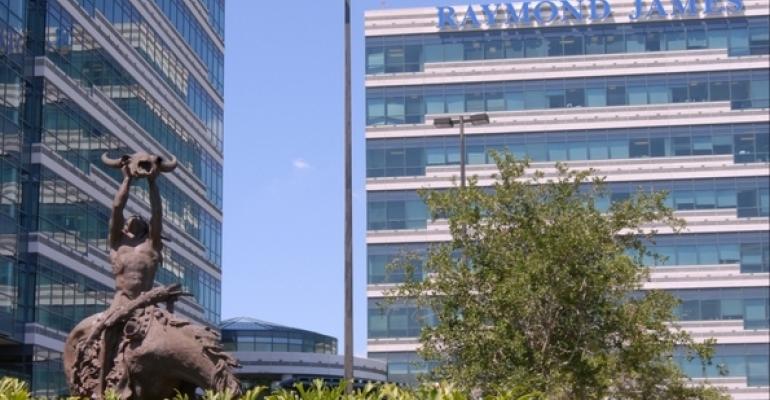Raymond James Financial reported record net revenues and net income for its fiscal year 2013, as the integration of regional broker/dealer Morgan Keegan into Raymond James & Associates comes to a close. The firm’s net revenues for the year was $4.5 billion, up 18 percent from fiscal year 2012, while net income for the same period was $367 million, a 24 percent boost from the prior year.
The firm also had a strong fiscal fourth quarter, with earnings per share of $0.93 beating analysts’ expectations by $0.31. The results were largely driven by a beneficial tax rate and higher performance in the firm’s capital markets and bank segments, CEO Paul Reilly said.
Net income for the quarter was a record $117.5 million, up 41 percent from the prior year period and up 40 percent sequentially. Net revenues were $1.12 billion, up 5 percent from the prior year quarter and 1 percent from the previous quarter.
On a conference call with analysts this morning, Reilly said the firm was declaring the Morgan Keegan integration finished. Cost synergies from the merger are starting to show, and the firm is getting back to business, so to speak, focusing now on organic growth and niche acquisitions.
The integration expenses were higher than the firm expected, at $130 million versus the anticipated $110 million, said Jeffrey Julien, chief financial officer.
Recruiting had slowed for the firm during the integration, as Raymond James focused on retaining Morgan Keegan advisors, Reilly said in an interview with WealthManagement.com during the firm's Women's Symposium in St. Petersburg, Fla. this week. “You don’t buy people in this business,” he said.
Total advisor headcount at the firm is now at 6,197, down from 6,210 a year ago but up slightly from 6,181 last quarter.
While the firm was worried that the Morgan Keegan acquisition would scare people away, a lot of advisors are realizing that the firm is committed to Raymond James & Associates, the firm’s employee channel, Reilly said. The flow of advisors out of the wirehouses has picked up, as retention packages wind down and legacy acquisition people seek out what they had before—a full-service firm with a regional feel.
“I think we’re back down to business,” Reilly said.
Raymond James tends to pay less in up-front transition money than competitors, but for good reason. “We want them to join us because they want to be here, not because of a check," Reilly said.
During the quarter, the firm’s private client group performed in line with the market, with assets under administration up 4 percent to a record $403 billion and fee-based assets up 6 percent to a record $155 billion. Meanwhile, the S&P 500 gained 4.7 percent during the quarter.
The segment’s revenues grew 7 percent from the prior year quarter to $742 million, while pre-tax income rose 26 percent year-over-year to $64.6 million. Raymond James does not report advisor production levels.
Acquisitions are not Raymond James' primary focus, Reilly said; Morgan Keegan was an unusual one.
But the consolidation in this industry will continue, and that will play to Raymond James' favor, Reilly said. You need scale to cover the support, technology and regulatory costs necessary to compete. But the firm will not do deals just to be big; they will do them to be good. And the firm is picky; the acquisition has to be the right cultural and strategic fit, he said.

